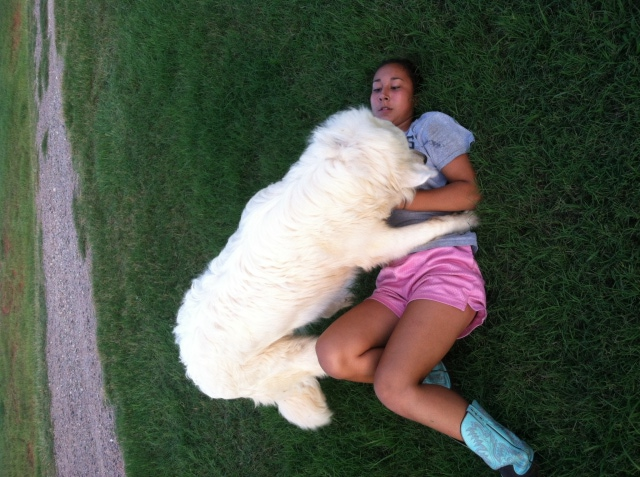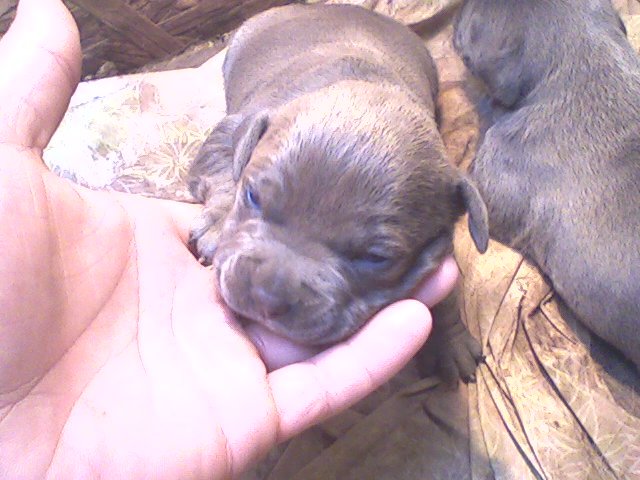QuestionQUESTION: Hello Mell, my baby toy poodle is almost two months old
now. She is suffering from a head tilt which she tries so
hard to cope with. It started two days ago where she has her
head tilt to the right and she keep on looking up to the
ceiling and try to exercise her head. I brought her to the
vet and the vet checked her ear and confirmed that she did
not suffer from infection, the vet noticed her eyes is
rolling slightly up and down when she looking at us. I think
that may be that was caused by the jumpy motorbike ride to
the vet clinic because she seems can focus better today. She
ate as usual and did not vomit even once. She had has twice
the antibiotic given by the vet yesterday but the tilting
head did not get better. Is that possible that there's
nothing to do with the brain and ear but actually her bone
since she seems normal in her daily life except with her
head tilt? I've tried to touch around the neck but she
didn't yell. She tried to scratch her right face or ear
sometimes. I wonder what had actually happened
in her and may I know what's the cure for this sickness?
ANSWER: Hi, thanks for your question. The eye jumping you mention is called nystagmus and it is a sign of a neurological or middle ear disorder.
The symptoms your dog are showing sound highly suspicious of a condition called vestibular disease (like vertigo in humans) although this is unusual at such a young age.
I am thinking it is either a middle ear infection though this should have shown some signs during the ear examiniation or possibly a neurological disorder. Such things as distemper or encephalitis (similar to meningitis in babies) can cause these signs.
The antibiotics are definately the way to go although I would be tempted to also try cortisone to reduce any inflammation in the brain/ middle ear which may be causing the head tilt. If there is no improvement the next step would probably be an xray of the middle ear/ skull. If still no definite diagnosis and no improvement the puppy should be referred to a specialist centre with more advanced equipment to diagnose other conditions.
I have copied and pasted the information below from a website containing some useful information on causes of head tilt in dogs.
I wish you and your little puppy all the best,
kind regards,
Mell
Vestibular diseases
Ear infection:
Infection of the middle/inner ear is a common cause of vestibular disease in the dog. Most cases can be diagnosed by a thorough examination of the ear with an otoscope. Ear culture, X-rays, computed tomography or magnetic resonance imaging is sometimes necessary. If bacteria cause the infection, treatment consists of appropriate antibiotics.
Canine idiopathic vestibular syndrome:
This is also a common cause of vestibular disease in the dog. Another name is geriatric vestibular syndrome. Older dogs (mean age 12.5 years) are primarily affected. There is a sudden onset of ataxia (which can be severe), head tilt, nystagmus and occasionally vomiting. The cause of this syndrome is unknown. Diagnosis is based on the signs and excluding other causes of vestibular dysfunction. Affected dogs improve spontaneously within 2 weeks, although there may be a mild, persistent head tilt. Nursing care is important during recovery. Unfortunately, affected dogs are sometimes euthanized because of the severe signs and concerns that the patient has a brain tumor or stroke.
Hypothyroidism:
Hypothyroidism can cause vestibular dysfunction in dogs. Signs may develop suddenly or over time. Diagnosis is based on laboratory evaluation of thyroid function and response to thyroid supplementation. Vestibular dysfunction typically resolves within 2 months of treatment.
Toxicity:
Medications placed in the ear are the most common cause of vestibular toxicity; although some orally administered drugs can also be a problem, especially at high doses. Ear drops or other substances should never be placed in a dog's ear except on the specific recommendation of a veterinarian.
Cancer:
Tumors in the inner ear or brain can cause vestibular problems. Older animals are more commonly affected and there may be pain on opening the mouth. Diagnosis is based on x-rays, CT, MRI, and/or biopsy.
Encephalitis:
Inflammation of the brain (encephalitis) can cause vestibular dysfunction. Causes include infections, such as distemper virus, and non-infectious causes. Diagnosis often requires analysis of spinal fluid. Some types of infection can be specifically treated with medications.
---------- FOLLOW-UP ----------
QUESTION: Thanks for your answer. I would like to ask what medicine
actually I'm feeding her, it is a dark orange liquid and
also white tablet which is divided into 4 pieces, fed twice
a day, 0.1ml and 1/4 tablet(1 piece)each. What can I do to
make her recover faster? I'm unsure is it ear mites are
irritating her that she scratch near her ears, can ear mites
being found using just cotton in and out the ear once? I
worry that the ear check missed some clues. Anyway I'm going
back for a check again as I was asked to at the day after
tomorrow. It is actually quite rush for me cause I wont be
able to take care of her after this week that I had to put
her at the day care central. I wish she can recover within
this week so I can stop worrying about her. By the way, may
I know any of these disease may threaten her life? And is it
totally impossible that the problem is actually her neck
bone?
ANSWER: the nystagmus is a vital clue, even though it is getting better it is still very important for any diagnosis. I cannot tell what the medication is, it should have a label which says what the medicine is called. Ear mites can only be seen under the microscope but will only ever be in an ear full of brown waxy material, if her ears are clean it is unlikely to be ear mites. I really feel it is very very unlikely to be a neck or spinal problem because she does not respond painfully to touching and movement of her neck. The nystagmus would not be present with either ear mites or neck injuries. If you are really concerned something was missed on the ear examination ask them to use a cotton tip to get a sample to look at under the mircoscope, this will show ear mites and bacteria if either of these are the problem.
As far as getting better goes, this may take a couple of weeks, i cannot say whether or not this is threatening her life as I do not know for sure what is going on with her but as long as she is eating and drinking and still bright that is a good sign. Talk to the vet about cortisone tablets also
---------- FOLLOW-UP ----------
QUESTION: Thanks again Mell. Is it possible that the nystagmus was
caused by the jumpy journey of the motorbike? And the vet
try to weight her and put her on the scale which is quite
high and she keep on rolling in it as she was scared. Her
eyes seem normal at home last night after the whole noon of
rest and calm. Would the ear damage caused when the ear
check been done? Cause she cried very loud when the cotton
was plug into her ear.
AnswerNo, the nystagmus could not have been caused from the ride there, her rolling while she was being weighed was probably due to balance problems due to a middle ear infection.
The crying when the cotton bud was inserted into her ear most likely suggests that her ear is sore which makes me think that it is most likely an ear infection or middle ear infection, get the vet to do an ear smear to check for bacteria as she most likely needs ear drops also and the medication that will be most effective depends on what type of bacteria is involved. You should see an improvement within 14 days.
I am almost certain this is either an ear infection or middle ear infection.
here is some more information on middle ear infections:
http://www.petplace.com/dogs/otitis-interna-and-media-in-dogs/page1.aspx
just close the box that opens when you open the page

 st bernard archy.
QuestionQUESTION: I have a four year old st bernard. I
st bernard archy.
QuestionQUESTION: I have a four year old st bernard. I
 Abby
Question
Abby Abby
what breed of dog do yo
Abby
Question
Abby Abby
what breed of dog do yo
 Great Pyrenees
Question
Shirley
We adopted Great Pyrenees femal
Great Pyrenees
Question
Shirley
We adopted Great Pyrenees femal
 worried about mom dog not lactating enough
Question
angel and her pups jus
I have a small mixed br
worried about mom dog not lactating enough
Question
angel and her pups jus
I have a small mixed br
 Puppy help? does this look like a nice quality puppy?
Question
3 weeks old
im getting this blue nose puppy so
Puppy help? does this look like a nice quality puppy?
Question
3 weeks old
im getting this blue nose puppy so